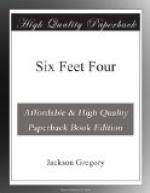Winifred stood across the room from him, her quirt in her hand switching restlessly at the carpet, her eyes showing a little sympathy for his illness but more anger at Buck Thornton.
“You ask why I don’t bring that man to reckoning, and I tell you that I am waiting. Then you ask, for what?” He leaned a little forward, and she saw again in his eyes the look she had surprised there on that first day she had come to Hill’s Corners, a look of hate and of a sinister satisfaction. “Waiting for the time when I am sure there will be no loophole for him to crawl through! You are ready to go into a court room and swear that he robbed you; that is a great deal and it will go a long way toward convicting him. But it isn’t enough. It’s only your word against his; don’t you see? He will swear that he did not rob you, won’t he? We can prove that you left Dry Town with the five thousand dollars; we might even prove that you didn’t bring it on to me. But we couldn’t prove, beyond the last shadow of doubt, that you didn’t lose it, or that somebody else didn’t rob you of it.”
“But,” she asked, frowning in her perplexity, “what good will it do to wait?”
“Your evidence,” he went on slowly, as though working the thing out for himself, “is enough to convince eleven jurors out of the twelve; now we must make sure of the twelfth. How will we do it? One way is to find the lost bank notes in Thornton’s possession. The other way is to get other evidence to add to yours, cumulative evidence all of which will point one way, to one conclusion!”
“To one conclusion?” she repeated after him, prompting him, so eager was she for him to go on.
“To the fact that Buck Thornton is the man who, for six months now, has been committing the series of crimes, running the gamut from the murder of a stage driver to the theft of cattle from Kemble’s place! That is the thing I am waiting for!”
She frowned. A mental picture of the cowboy rose quickly and vividly before her. She saw the clear, steadfast eyes, the free, upright carriage, the flash of a smile that was like a boy’s. She had come to be firm in her belief that he was the man who had robbed her, had forced the insult of his kiss upon her, but it was hard, with that picture of him before her, to think him a murderer, too. But then, as though to sweep away her last shred of doubt, the vision widened and into it came another man: she saw Buck Thornton as she had seen him only a few minutes ago, in seeming friendly conversation with the youngest Bedloe whose eyes soiled the woman they rested upon, whose name had travelled even to her home in Crystal City and beyond as a roisterer, a brawler, a man of unsavoury deeds done boldly and shamelessly.
“I am a little sick of it all,” she said wearily. “I want to go back home, uncle.”
He had looked for that and had his answer ready.
“I know, Winifred. And I don’t blame you. But I want you to stay a little longer, won’t you? Your evidence is going to be the strongest card in our deck. Will you stay and give it?”




